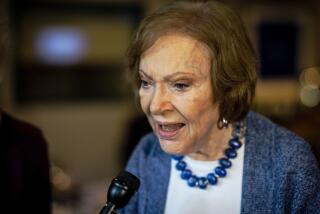As Obama’s staff shifts, one aide holds fast
Reporting from Washington — It was all in a recent day’s work for Valerie Jarrett.
She reassured Jewish leaders about White House strategy on Egypt, helped the first lady sync her spring agenda with her husband’s, ushered a former Fed chairman into the Oval Office, soothed the Rev. Al Sharpton’s concerns about education policy and took a stroll with President Obama across Lafayette Park to patch things up with some irritated CEOs.
The schedule illustrates that no one else in the White House now has a range of responsibilities equal to Jarrett’s. When Obama took office, she was the least seen of his four senior advisors. Now Chief of Staff Rahm Emanuel, chief political strategist David Axelrod and Press Secretary Robert Gibbs have all departed. Jarrett, 54, remains, picking up new duties from each of them. Long the closest personal confidant of Barack and Michelle Obama, she is steadily becoming more visible at the president’s side.
New Chief of Staff Bill Daley may be the White House major-domo, but when there is a staffer in the presidential limo, more often than not it is Jarrett.
Before coming to the White House, Jarrett was head of the Habitat Co., which develops and manages residential properties. The arrival of Daley, until recently an executive at JPMorgan Chase & Co., raises the question of how the two former business executives will jockey within the White House power structure.
In an interview, Daley scoffed at the idea of a rivalry. The two have known each other since she worked for his brother, Chicago Mayor Richard M. Daley, in a family that keeps copious record of services rendered.
“We aren’t best-buddies sort of thing, but she was always helpful to Rich,” Daley says. “She’s one of the people I felt confident could tell me about the job, how this place works, what’s good and bad, how I can be helpful.”
When Jarrett voiced concern that no women’s names were being floated to replace Gibbs as press secretary, for instance, Daley joined her in requesting more diversity in the pool of candidates. When his 7:30 a.m. senior staff meetings break up, he says, Jarrett often lingers to talk with him.
In a larger sense, insiders say, that means Jarrett doesn’t have to jockey with anyone.
“She has a unique relationship with the president — a deep understanding of him,” said Axelrod. “That is critical to him. It’s important to him to have people who have that relationship around him.”
She is a consensus-builder who reinforces Obama’s tendency toward centrism, but is also a voice for women and minorities in policy considerations. Her involvement in an issue has the presidential imprint. Her presence is seen as his proxy, as when she visited with the Dalai Lama while Obama first paid respects to the Chinese president.
Jarrett hasn’t made everything smooth for her boss. As Obama’s liaison with business, for example, she strained relations with the U.S. Chamber of Commerce and its president, Tom Donohue, when she said publicly that the White House preferred meeting with real industry executives such as the members of a competing organization, the Business Roundtable. At the time, the Roundtable was considered somewhat more supportive of White House initiatives on healthcare and climate change.
Obama’s Wall Street supporters also wondered why Jarrett didn’t stop Obama from referring to bankers as “fat cats,” a phrase the president quickly abandoned.
One financial services executive described Jarrett as “tough as nails” and “very political.” He said she drew “a combination of fear and respect” from business executives who know her. As a measure of the trepidation she inspires, when one business leader was asked to talk about Jarrett on the record, he said: “It would only be good.”
Officially, Jarrett is senior advisor and assistant to the president for intergovernmental affairs and public engagement. Unofficially, she has been an advisor on just about every major issue Obama has faced.
Staffers tend to speak in nebulous terms when describing Jarrett’s role, possibly because so much of what she does is, by her own design, behind the scenes.
One aide tells this story:
A few months into the administration, staffers noticed that the irascible economic advisor Larry Summers was doing a lot of the talking in top-level meetings. After one meeting, Jarrett mused aloud that Christina Romer, then the head of Obama’s Council of Economic Advisors, seemed to have been stifled.
“I didn’t think much of it,” said the aide, who requested anonymity to speak about the private comment, “until the next time we were all with the president again.”
This time, the aide noticed, Obama pointedly called on Romer for her view, pressing her with follow-up questions that made it clear that interjections from others were not welcome at the moment.
Sharpton, the civil rights activist and radio host, said that when Jarrett “says something is going to get done, it gets done. You just get the sense you’re talking to someone with influence on, and access to, the president, even though she never says that out loud.”
During the gulf oil spill last year, some Republican governors came to a similar conclusion.
Emanuel had used a swear word with an aide to Louisiana Gov. Bobby Jindal, accusing the governor of making an aid request by way of the media. The president asked Jarrett to do a little state and local outreach.
She set up a conference call and invited the Gulf Coast governors to dial in.
Several White House aides gathered around the long walnut table in her office with white legal pads, furiously scribbling down all requests for equipment, aid, information.
She made it a daily event, including the Coast Guard commandant to update the governors. Federal honchos reported on where the oil sheen was moving, how much boom material was available, which warehouse it was in.
Alabama’s then-Gov. Bob Riley called Jarrett the “most effective” White House person he’d ever dealt with.
Obama’s trust in Jarrett traces back 20 years to when she was deputy chief of staff to Chicago Mayor Daley and recruited a young lawyer, Michelle Robinson, to work for her.
Before accepting the offer, Robinson wanted Jarrett to meet fellow lawyer Barack Obama, whom she planned to marry. Obama wanted to know who was going to be watching out for Robinson in the thicket of Chicago politics.
After a long dinner at a seafood restaurant downtown, Obama told Jarrett he trusted her to look out for his wife-to-be.
Jarrett was as good as her promise, and extended it to include Obama himself. She served as an informal advisor and fundraiser as Obama ran for the state Senate, U.S. House and U.S. Senate.
The families are now close friends. Obama family vacations to Martha’s Vineyard and Hawaii regularly include Jarrett and her daughter, Laura, a lawyer in Chicago. (Laura’s father and Jarrett divorced in 1988.)
When the Obamas moved to Washington, Jarrett moved into a Georgetown condo. Symbolic of her even closer role, she is now moving to a new place just a 10-minute walk from the White House.
When somebody needs to deliver bad news to the president, the usual response of the staff is, “Let’s have Valerie tell him,” says Michael Strautmanis, her advisor and another Obama friend from Chicago.
It’s not just Obama who gets those visits. Jarrett was the one who told a Chicago friend, then-Social Secretary Desiree Rogers, that it was time for her to leave the White House. Rogers was held responsible when an enterprising Washington couple crashed the gate at a state dinner for the Indian prime minister.
The other day, when Jarrett appeared unexpectedly at a colleague’s office, the woman gasped.
“Is it time for me to leave?” she asked, laughing.
On her recent busy day, Jarrett’s battery of staff meetings included one with national security staff, as they fanned out to talk with U.S. Jewish leaders about the push for transition in Egypt.
Later she and her senior team met with Tina Tchen, Michelle Obama’s chief of staff. Still later, Sharpton dropped by with his daughter. He said he left reassured that Obama wanted better accountability measures for public schools but opposed sending public school money to private schools through Republican-backed vouchers. Jarrett also chatted with former Federal Reserve Chairman Paul Volcker before he had lunch with the president.
The centerpiece of the day was the stroll across the park with Obama to an assembly of the Chamber of Commerce.
When Obama introduced his staff, Daley alone drew applause.
During Obama’s speech, Jarrett sat beside Donohue, the chamber’s president. As Obama laid down a JFK-style challenge, urging business to invest in American workers — asking not what their country can do for them — Donohue leaned over repeatedly to whisper to Jarrett.
It was a sign that despite Daley’s popularity in the business community, the chamber leaders know who has the president’s ear. (Relations with business are better now, Jarrett told a TV reporter recently, because “we’re in a different phase now.... Our interests are more aligned.”) Daley made it clear in an interview that Jarrett was the “senior person on business outreach” and that he was there to complement what she did, not take it over.
When the address was over, Obama shook a few hands and then set out for the White House. Jarrett walked beside him, stride for stride.
More to Read
Sign up for Essential California
The most important California stories and recommendations in your inbox every morning.
You may occasionally receive promotional content from the Los Angeles Times.











